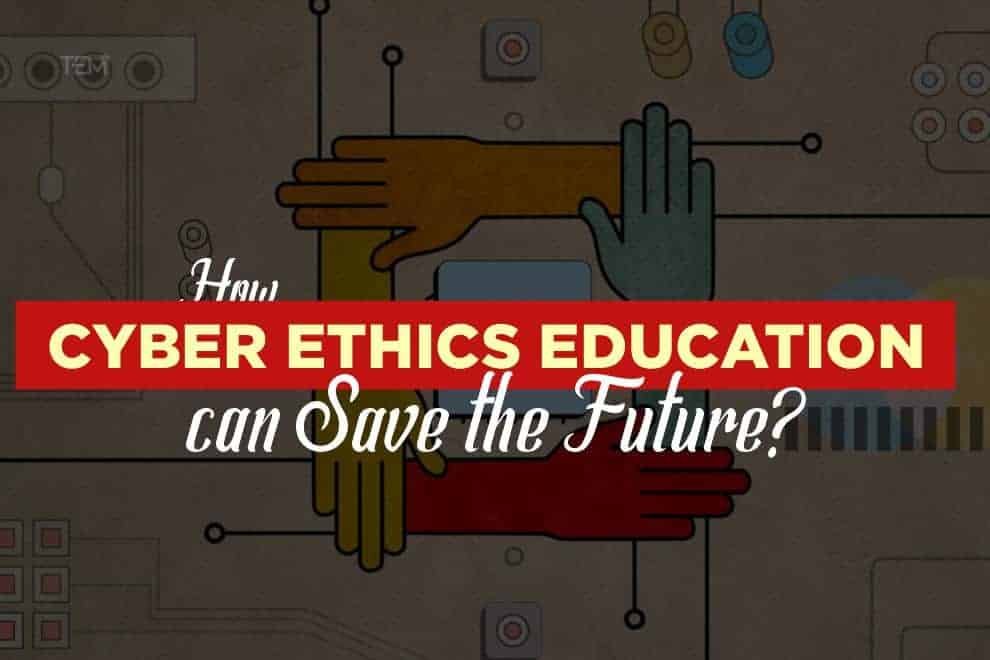Compared to most people around the world, Americans enjoy relatively more freedom to do what they want an online-a big reason why is the First Amendment which limits the United States government’s ability to restrict its citizen speech. Having all this freedom means that we can make choices, but how do we determine which online behavior is acceptable and which one is not under the rules of cyber ethics. For instance, College students might face dilemmas like; is it okay to lie on a dating app; post an edited photo; break up over text or skip the breakup and go with someone else; watch a controversial film, or what about pornography?
All of these digital things are legal, but should we do them? What makes us think twice about doing them? What makes us feel bad about doing them? Or what makes us avoid doing them in the first place?
And that’s where ethics and norms come into play. In fact, the mere decision to embrace technology like the Internet may be considered an ethical choice. Some philosophers have long regarded technology as a dark and dehumanizing force. This technological pessimism holds that technological improvements do not lead to an improvement in the human condition. But instead, they lock us into a virtual and inescapable cage that menaces our individuality and authenticity. This belief that technology is inherently bad first gained traction more than 200 years ago during the industrial revolution. A movement known as the Luddite blamed the rise of industrial mills and advanced factory machinery for the loss of their jobs and they wanted to destroy this new technology that threatened their livelihoods.
Technological Pessimism vs. Technological Utopianism

More recently, an infamous adherent is Ted Kaczynski a.k.a Unabomber. He was a former Berkeley math professor who became a recluse and decided that technology was destroying the world. In fact, he wrote a lengthy anonymous manifesto in which he expressed his views and got it published in major newspapers. Now over the course of about 15 years, Kaczynski engaged in domestic terrorist attacks against Americans in an attempt to start a revolution. In particular, he targeted people who were involved with modern technology and he killed three and injured 23 others. In the late 1990s, Kaczynski was finally caught and he was sentenced to life imprisonment. It was the longest and most expensive investigation in the history of the FBI. Kaczynski argued that his bombings were necessary to attract attention to the erosion of human freedom and dignity by modern technologies. Many scholars consider Kaczynski’s manifesto a work of genius that raises uneasy ethical questions.
In recent years technological pessimism has grown among Americans. For example, a 2020 survey found that 21% of Americans said the Internet was bad for society. As artificial intelligence threatens to replace human workers, the Luddite movement could make a strong comeback.
On the other hand, the concept of technological utopianism view-point believes that technology can be used to create an ideal world by improving lifestyle and jobs. One famous philosopher who supports this idea is Karl Marx. He believed that science and technology would help delegitimize the role of kings and the power of the church and create a better freer society. More recently a techno-optimism movement has flourished in Silicon Valley centered around the belief that technology particularly the Internet will improve communication, democratize society and make the market more efficient. But the entrepreneurs like Mark Zuckerberg often ignore the negative effects that their inventions have on society.
Between these two extreme positions, techno-optimism and pessimism is a position known as technological neutrality. This middle viewpoint believes that technology is merely a tool that can be used for good or for bad, and it’s humans who ultimately determine whether technology is used for good or bad.
Cyber Ethics professor Richard Spinello argues, “we must recognize that in fact, we do still have some degree of freedom in our digital world. For example, we can choose to implement laws and program codes in ways that protect fundamental human rights such as autonomy or privacy.”
How To Achieve Cyber Friendly Society?

It begins by developing sound ethical judgment on how to constrain the negative side effects of technology. Behaving ethically may seem like a matter of common sense but true ethical dilemmas often involve complicated situations that can’t easily be solved through simple intuition or common sense. Cyber Ethics is not the same as feelings either though feelings provide important information for ethical choices. We may feel good even when doing something bad or vice versa. Finally, Cyber Ethics is not a matter of simply following the law. A good legal system certainly incorporates ethical standards but laws can deviate from what is ethical. For example, a totalitarian regime that tramples on human rights is not ethical.
Laws can also be slow to address new problems which often happens when it comes to governments regulating the Internet. So, that’s why ethics and sound ethical judgment is important to have.
There are several different types of ethical reasoning that can help us provide a moral compass. When we have to make more judgments. There are six major frameworks that people should be aware of:
- Utilitarian approach –
Philosophers such as John Stuart Mill believed that the best action is the one that provides the most good or does the least harm for everyone affected. In e-commerce, that would mean things like selecting the action that produces the greatest good and does the least harm for all stakeholders such as customers, employees, shareholders, the community and the environment. Ethical cyberwarfare would balance the good achieved through a cyber attack against the harm done to all sides. Thus, the utilitarian approach calculates the consequences to determine what is the ethical choice.
- Rights approach –
Philosophers such as Emmanuel Kant believe that the best action is the one that most respects and protects the moral rights of those affected. In Cyber Ethics, many people include things like the freedom of expression or rights to privacy or rights to be forgotten. This approach is based on the notion that humans have an inherent right to choose how to live their lives. They also have a moral duty to respect others in the same way.
- Justice or fairness approach –
Aristotle said that equals should be treated equally and unequals unequally. In other words, what is fair for one should be fair for all. Both favoritism and discrimination are unjust and wrong. Treating people equally may not mean treating them the same, for example, a company may hire one candidate over another based on who has more experience and say that is fair. But there is currently a debate over the lack of representation of minorities and women at tech companies, leading many to question whether the huge disparity is based on a defensible standard or whether it’s the result of discrimination and hence is unfair.
- Common good approach –
Aristotle and other Greek philosophers also believe that ethical choices should benefit all members of the community. In order for society to flourish this philosophy holds; people must accept modest sacrifices for a common good rather than selfishly protecting their own interests above society’s interests. An example of a common good approach would be providing Internet access to everyone including rural communities even though it might not be cost-effective and take resources away from city dwellers. This approach directly contrasts a controversial philosophy known as ethical egoism, which was exemplified by Ein Rand who advocated looking out for oneself above all else.
- Virtue ethics –
Virtue ethics is a very ancient approach to ethics. It was developed by the Greeks and by Chinese philosopher Confucius. This philosophy assumes that we acquire virtue through practice. By practicing being honest, being brave, being tolerant and so on people develop an honorable and moral character that helps them make the right choice when faced with ethical challenges. Virtue ethics asks of any action what kind of person will anyone be if he/she does this or is this action consistent with their character. For example, a lawmaker might want to block constituents who criticize her on social media but what kind of public servant would that make her. Shouldn’t she listen to her community’s concerns
- Religion approach –
The religious approach is another ancient approach and it’s based on the commands of God. Adherents believe that the ethically correct action is the one that god commands or requires. Under this divine command theory, being ethical is equivalent to doing whatever the sacred text or source of revelation tells you to do. But this philosophy is premised of course on the existence of god, which is not universally accepted. It’s also premised on the interpretation and application of sacred texts which believers may disagree over.
In this blog, America is used as nothing but an example or metaphor for all the cyber advanced countries in the world.
Also Read,
Best Websites For Self Education Resources
How Neuralink ‘Merging Man And Machine’ Can Change The Future?










